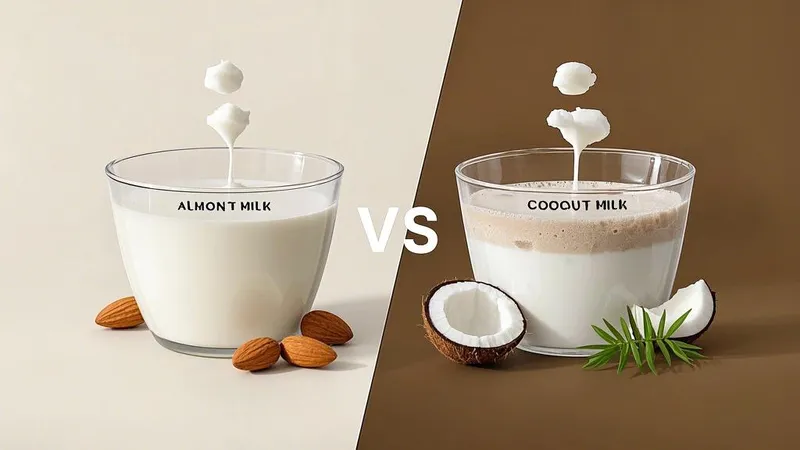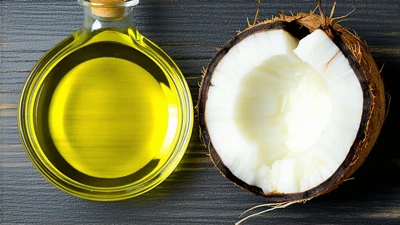
Comparison Table: almond milk vs coconut milk
| Comparison Item | Almond Milk | Coconut Milk | Notes |
|---|---|---|---|
| Definition | Made from almonds and water, often with added thickeners and nutrients. | Made from coconut meat and water, available in beverage form and canned (for cooking). | Almond milk is typically thinner, while canned coconut milk is thicker and suitable for cooking. |
| Calories (per cup, 240ml) | 30-50 kcal (unsweetened version) | 45-552 kcal (beverage type ~45 kcal, canned type up to 552 kcal) | Almond milk is lower in calories, suitable for calorie control; canned coconut milk is high in calories, ideal for high-energy needs. |
| Fat Content (per cup) | 2.5-3 g (mostly unsaturated fat) | 4-57 g (beverage type ~4 g, canned type up to 57 g, mostly saturated fat) | Almond milk is low in fat, while canned coconut milk is high in fat, suitable for high-fat diets. |
| Saturated Fat (per cup) | 0.1 g | 3.5-21 g (beverage type ~3.5 g, canned type up to 21 g) | Almond milk has almost no saturated fat, while coconut milk is high in saturated fat; intake should be monitored. |
| Protein (per cup) | 1 g | 0-6 g (beverage type ~0 g, canned type ~6 g) | Both are low in protein, with almond milk slightly higher, but still much lower than cow's milk. |
| Carbohydrates (per cup) | 1-3.4 g | 2-13 g (beverage type ~2 g, canned type ~13 g) | Almond milk is lower in carbs, suitable for low-carb diets; canned coconut milk is higher in carbs. |
| Sugar (per cup) | <1 g (unsweetened version) | <1 g (unsweetened version), sweetened versions may contain up to 8 g | Unsweetened versions of both are low in sugar; sweetened versions should be consumed with caution. |
| Calcium (per cup) | 300-482 mg (usually fortified) | 16-45 mg (usually unfortified) | Almond milk is often fortified with calcium, good for bone health; coconut milk is low in calcium and may require supplementation. |
| Vitamin E (per cup) | 20-25% DV (Daily Value) | 20% DV | Almond milk is rich in vitamin E, with strong antioxidant properties; coconut milk has lower vitamin E content. |
| Potassium (per cup) | 180-220 mg | 50-600 mg (beverage type ~50 mg, canned type ~600 mg) | Almond milk has moderate potassium levels, while canned coconut milk is high in potassium, suitable for electrolyte replenishment. |
| Fiber (per cup) | 0.6-1.5 g | <0.5 g | Almond milk has slightly higher fiber content, while coconut milk is very low in fiber. |
| Sodium (per cup) | 170 mg | 13-46 mg | Almond milk has higher sodium content, while coconut milk is lower in sodium, suitable for low-sodium diets. |
| Target Audience | - Low-calorie dieters - Low-fat dieters - Those needing fortified calcium and vitamin E | - High-energy needs - High-fat dieters - Those who prefer a rich, creamy texture | Almond milk suits healthy diets, while coconut milk is ideal for specific dietary needs. |
| Environmental Impact | - High water usage for almond cultivation (~3.2 gallons per almond) - Drought issues in California | - Low water usage for coconut cultivation - Mainly produced in Southeast Asia, with lower environmental impact | Coconut milk is more environmentally friendly, while almond milk faces criticism for high water usage. |
| Allergens | - Avoid for those with tree nut allergies | - Coconut is classified as a tree nut but is generally safe for most tree nut allergy sufferers | Almond milk is unsuitable for tree nut allergy sufferers, while coconut milk is relatively safer. |
Video introduction to the coconut milk
The main differences between the almond milk and the coconut milk.
Nutritional Profile
Almond Milk: Typically lower in calories compared to coconut milk, especially if unsweetened. Contains healthy fats but not a significant source of protein. Often fortified with vitamins and minerals, such as calcium and vitamin E.
Coconut Milk: Higher in calories and fat content than almond milk, particularly saturated fat due to its coconut oil content. Minimal protein content but can be richer in certain nutrients like iron and magnesium depending on the type (e.g., canned vs. carton).
Taste and Texture
Almond Milk: Has a slightly nutty flavor and a thinner consistency, making it versatile for drinking, cooking, and baking.
Coconut Milk: Offers a distinctively sweet and tropical flavor with a thicker, creamier texture, especially the canned variety used in cooking. Carton versions are generally thinner and more suitable for drinking.
Uses
Almond Milk: Commonly used as a dairy-free alternative in cereals, coffee, smoothies, and baked goods due to its mild flavor and light texture.
Coconut Milk: Frequently used in savory dishes, curries, and soups where its rich flavor and creamy texture enhance the dish. Also used in desserts and beverages that benefit from its distinctive taste.
Production Process
Almond Milk: Made by blending ground almonds with water and then straining the mixture to remove solids.
Coconut Milk: Produced by grating the flesh of mature coconuts and soaking it in water, then straining the liquid. Canned coconut milk is thicker because it includes more of the coconut solids.
Availability and Varieties
Both almond and coconut milks come in various forms including unsweetened, sweetened, flavored (like vanilla), and organic options. They are widely available in most supermarkets, though specific varieties may differ.
Author's view
Almond Milk is more suitable for people on a low-calorie, low-fat diet, and is rich in calcium and vitamin E, but is less environmentally friendly.
Coconut Milk is suitable for people with high energy needs, especially canned coconut milk, which is suitable for cooking and special dietary needs, and is more environmentally friendly.
FAQs
1. Which is lower in calories?
Almond Milk: Typically contains 30-50 calories per cup (unsweetened), making it a lower-calorie option compared to coconut milk.
Coconut Milk: Contains 45-50 calories per cup for carton versions, but canned coconut milk can have up to 360-420 calories per cup due to its higher fat content.
2. Which is better for heart health?
Almond Milk: Low in saturated fat and rich in heart-healthy monounsaturated fats, almond milk is a good choice for those managing cholesterol levels.
3. Which is better for weight management?
Almond Milk: With fewer calories and lower fat content, almond milk is ideal for those looking to reduce calorie intake.
Coconut Milk: Higher in calories and fat, but its MCTs can boost metabolism and provide quick energy, making it suitable for those on high-fat diets like keto.
4. Which is better for bone health?
Coconut Milk: While lower in natural calcium, some brands fortify coconut milk with calcium and vitamin D, though it generally provides less bone-supporting nutrients than almond milk.
5. Which is better for skin and hair health?
Almond Milk: Rich in vitamin E, an antioxidant that promotes skin elasticity and hair growth.
Coconut Milk: Contains lauric acid, which hydrates skin and strengthens hair, making it a popular choice for moisturizing treatments.
6. Which is better for people with allergies?
Almond Milk: Not suitable for those with nut allergies, as almonds are tree nuts.
Coconut Milk: Generally safe for those with nut allergies, as coconuts are classified as fruits, though some individuals may still have sensitivities.
7. Which is better for cooking and baking?
Almond Milk: Its mild flavor makes it versatile for both sweet and savory dishes, though it may result in a lighter texture in baked goods.
Coconut Milk: Its creamy texture and tropical flavor make it ideal for curries, soups, and desserts, but it may overpower dishes requiring a neutral taste.
8. Which is more environmentally sustainable?
Almond Milk: Requires significant water for almond farming, which can strain resources, especially in drought-prone areas like California.
Coconut Milk: Generally has a lower environmental impact, as coconut trees require less water and can grow in diverse climates.
9. Which is better for coffee or tea?
Almond Milk: Its light, nutty flavor blends well with coffee and tea without overpowering the drink.
Coconut Milk: Adds a creamy, tropical twist to beverages, but its strong flavor may not suit all palates.















